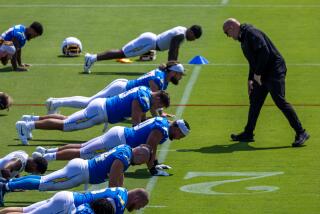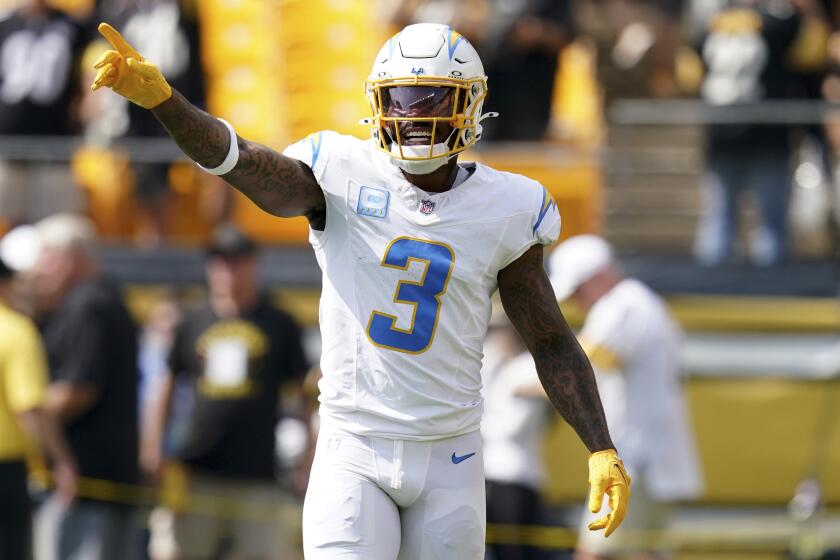In Raiders-NFL Clash III, L.A. Is the Trophy
Twenty years ago, a blockbuster court case paved the way for the Oakland Raiders to move to Los Angeles and cemented Raider owner Al Davisâ reputation as the maverick of the National Football League--the enigma in silver and black who whipped the league in court for millions of bucks.
Fifteen years ago, in the United States Football Leagueâs landmark $1.7-billion antitrust case against the NFL, Davis testified against his league. The NFL technically lost that case but actually won big when jurors awarded $1 in damages. Under the law, the award was trebled, to $3.
Now itâs decision time in yet another case pitting Davis against the league. Today, a Los Angeles Superior Court jury begins deliberating the case of the Oakland Raiders vs. the NFL. Once again, the stakes are enormous--certain to affect the future of the NFL, the Raiders, Davis and the direction of pro football in Los Angeles.
The Raiders are seeking more than $1 billion in damages, claiming the league interfered with a 1995 deal to build a stadium at Hollywood Park and forcing the team back to Oakland, its original hometown. The Raiders, who played in Los Angeles from 1982 to 1994, also contend they still own the L.A. market for NFL football. The team also is asking for punitive damages. During seven weeks of trial, the NFL aggressively denied any wrongdoing.
The ramifications of a Raider win--hardly certain but not unthinkable, at $1 billion or more--would be widespread, according to trial observers and legal experts.
The Raiders are locked into a long-term lease in Oakland. The league has no plan to put a team in Los Angeles; the expansion Houston Texans, the NFLâs 32nd team, begin play next year and league Commissioner Paul Tagliabue has said repeatedly that 32 teams will be it for a good while.
Even so, as Tagliabue made clear in his testimony at the trial, the NFL would love to be back in Los Angeles. The league covets L.A. as a site for Super Bowls, and Los Angeles is the nationâs No. 2 television market and is the U.S. corporate home of the Fox TV network, one of the NFLâs television partners.
Davis testified that in 1995 he wanted to be in L.A. Since returning to Oakland, he has told confidants that, all things considered, he would prefer to be in Los Angeles. Should the Raiders win $1 billion or more, he would--pending appeals--be sitting on a pile of cash. Though there is that lease in Oakland, everyone knows the No. 1 principle in business and politics is simple: Money talks.
If Davis wins, any serious assessment for NFL football in Los Angeles must once again figure in the Raiders--even as other franchises, among them the New Orleans Saints and Minnesota Vikings, review their balance sheets and ponder the possibilities that beckon in L.A.
Also, at age 71, after a career that already has gotten him into the Pro Football Hall of Fame, a win in court would give Davis new reason to swagger.
If he loses, some say it would be the beginning of the end of his legendary career of doing it his way.
Davis has heard them. He said in an interview that he wouldnât dare try to predict what the jury of eight men and four women will do. But, never at a loss for words, he called the trial âtotal vindication for the Raiders.â
He added: âAt the start of the trial, the commissioner was caught in a raft of lies. And by the end of the trial, it was shown he had been navigating the raft.â
The friction in Davisâ relationship with Tagliabue in particular, and the league in general, has been one of the two themes in the case--the Raiders maintaining that they get treated different, even discriminating against them, because of the 1980s lawsuit and because they are, as Davis says in his Brooklyn accent, âthe Ray-duhz.â
âThere was undisputed evidence that the league destroyed the deal for a privately funded, state-of-the-art stadium at Hollywood Park,â Davis said, âand violated its own constitution and bylaws to drive the Raiders out of Los Angeles.â
In an interview, Tagliabue said he personally bears Davis no ill will.
âAl basically chose to look at the glass as half empty instead of half full, which is part of his negativism. He used [the Hollywood Park proposal] to leverage an even better deal in Oakland.
âNow Oakland is not working. He is in litigation up there,â with several East Bay entities, whom Davis accuses of luring the Raiders to Oakland with allegedly fraudulent promises of sellouts. A trial date in that case will be set later this year in Sacramento Superior Court.
âOf course,â Tagliabue said wryly, âthe problems are everyone elseâs fault. Thatâs what it boils down to.â
Such friction has gone hand in hand with the other key theme, the history of the first case between the team and the league, which landed the Raiders in L.A. in 1982. Legally, that case was brought on antitrust grounds; practically, it centered on the Raidersâ right to move.
Tagliabue then was a lawyer for the league. Joseph L. Alioto, the former mayor of San Francisco, headed the Raider legal team. His son, Joseph M. Alioto, heads the Raider legal brigade now.
In the first case, the Raiders won $35 million. After a few years, the team and the league agreed to settle. By then, the judgment had grown to $64 million. The league paid $18 million. The Raiders claim that the team âpaidâ the difference, $46 million, for the right to the Los Angeles market.
Almost all civil cases settle before trial, and that this one did not indicates plainly that each side has what lawyers call âa bad factâ--one thatâs just hard to get around. The Raiders are in Oakland. That is a bad fact for an entity that claims to own Los Angeles.
Alioto has a ready answer--if someone buys a house in Los Angeles, and then moves to Oakland, who still owns the house in Los Angeles?
Speaking of the Los Angeles market, he says: âWe bought it. We paid for it. They want it back, they should pay for it.â
The leagueâs position is that the Raiders did not âpayâ for anything. There was a settlement, not a payment, the league says.
Meanwhile, the league has had to confront its own âbad factâ--the possibility of a second team sharing the Hollywood Park site with the Raiders.
The evidence is undisputed that the NFL went well beyond what it had ever done before in offering the Raiders--in the proposed Hollywood Park complex--at least one Super Bowl, as well as 18,000 Super Bowl tickets and a waiver of the visiting teamâs share of the gate. NFL lawyer Allen Ruby estimated the value of that offer at more than $200 million.
Tagliabue said he had hopes that the complex would have been âthe Disneyland of sports.â
The Raiders claim, however, that Hollywood Park needed at least two Super Bowls to make the finances of the deal work.
In May 1995, the NFL authorized a second Super Bowl--but conditioned it on an option agreement that would have put a second team in the stadium. The NFLâs position is that it wanted to explore the possibility of putting a National Football Conference team in the stadium as a way to replace the Rams, who left Anaheim for St. Louis earlier in 1995. Television revenue also helps explain why. The Raiders play in the leagueâs American Football Conference; Fox, which at the time was new to NFL telecasts, broadcasts NFC games.
The terms of the second-team option kept changing, and in June 1995, Tagliabue testified, he changed them one more time--to allow for the possibility of the second team beginning play at the same time as the Raiders.
Tagliabue testified that he thought that would give the league needed flexibility.
The deal also would have granted the second team a five-year lease, while locking the Raiders in for 20 years, meaning team two would have had the luxury of getting started at Hollywood Park while building its own new stadium. The option demanded nothing from team two for construction of the Hollywood Park stadium. And it would have given that team more money than the Raiders from the splits of the new stadiumâs key profit centers--the luxury boxes and club seats--even though projections were that team two would be able to sell its boxes and club seats cheaper than the Raidersâ premium seats.
To then get hit with the possibility of competing head-to-head with a second team, Davis testified, was the deal-killer.
The plan collapsed, the Raiders announced two weeks later that they were moving to Oakland and team two never became a reality; neither did the Hollywood Park stadium.
The Raiders have pointed out, over and over, that no other NFL team has ever had a second team imposed on it, much less at a new stadium. New Yorkâs Giants and Jets share Giants Stadium, but that arrangement is mutually amicable.
Alioto, in an interview, said of the NFL and Tagliabue, âI really think--I sincerely believe this--this is the epitome of what Lord Acton was talking about when he said, âPower corrupts and absolute power corrupts absolutely.â â
In closing arguments, Alioto said the Raiders had fixed their damages at a minimum of $991 million, a maximum of $1.42 billion, plus punitive damages. Regarding NFL owners and executives, Alioto said, âTheyâve got to stop this and theyâre not going to pay attention to anything but money. Itâs the only thing that moves these guys.â
Experts said it would be foolish to dismiss the possibility of a blockbuster verdict.
Robert Hirschhorn, a Texas-based jury consultant with Cathy Bennett & Associates, a firm that has served as advisors in the William Kennedy Smith rape trial and other high-profile cases, said about the Raiders and Alioto, âWhat youâve got is a charismatic lawyer representing an organization that has always been perceived as the underdog and treated differently.
âIf jurors believe, like many people, that the Raiders have been treated differently, this is their chance to even the score.â
Alioto asked jurors to award enough money to the Raiders to send an unequivocal message to the NFL about disparate treatment: âDonât even think about doing it again.â
He also said outside court that he is mindful of history--and hopes jurors will be. âItâs 1980. Itâs deja vu all over again. Itâs got to stop.â
The NFL also is well aware of the past. âThe last time we faced a billion-dollar case was the USFL suit,â league spokesman Joe Browne said, adding: âWe do not like to waste time or effort defending billion-dollar suits. But weâre not intimidated by them either.â
More to Read
Go beyond the scoreboard
Get the latest on L.A.'s teams in the daily Sports Report newsletter.
You may occasionally receive promotional content from the Los Angeles Times.










